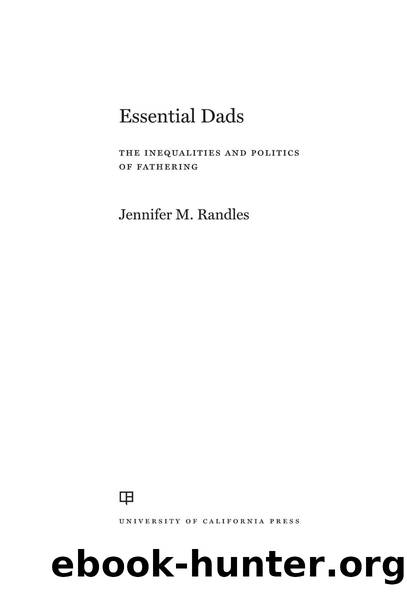Essential Dads by Dr. Jennifer M. Randles

Author:Dr. Jennifer M. Randles [Randles, Jennifer M.]
Language: eng
Format: epub
Tags: Social Science, Gender Studies, Men's Studies
ISBN: 9780520974388
Google: XGv_DwAAQBAJ
Publisher: Univ of California Press
Published: 2020-10-13T05:32:37+00:00
BREAKING OUT OF THE BREADWINNER BOX
Classes were not particularly prescriptive about what kind of masculinity was required to âman upâ as responsible fathers. Staff talked more about challenging stereotypes of how men should think, feel, and act. Fathers learned that being real men involved doing some, if not necessarily equal, childcare. The 24/7 Dad lesson on âGetting Involvedâ included a section entitled âDonât Let Mom Do All the Work,â which explained, âHelping with school work, meetings, and events gives mom a break. Getting involved will help your child and your marriage. It takes the pressure off mom and shows your wife and child that you respect her.â30
Another lesson on the importance of special daily moments urged fathers to âspend time every day with your children and, if married, with your wife.â.â.â. Tuck your kids into bed, take an evening walk, or simply have dinner or breakfast together.â31 These messages implied that mothers are mostly responsible for the daily labor of childcare and that fathersâ âhelpingâ gives mothers a much-appreciated respite from care work. In addition to the problem of assuming, in most cases erroneously, that fathers coparent with mothers to whom they are married, this encouragement to assist moms and spend quality time with children presented a limited view of fathersâ day-to-day care responsibilities.
The director Samuelâs description of why fathers needed to be involved in the daily care of their children suggested a more equitable division of labor necessitated by the economic realities of modern family life: âWe really try to stress that both units should be handling the business of both ways. We all know that weâre not the traditional 1950s setup anymore, where the man is the breadwinner and the mom stays at home. For a lot of families to function, two parents need to be out there doing the job and also taking care of the kids.â Unfortunately, in doing both, Samuel explained, fathers often find themselves in a dilemma. Despite a growing expectation for fathers to take on a caretaking role, they receive little social support and face stigma when they do:
Traditionally, men have been the second thought. Thereâs always been resources for women, but men have not always had these resources.â.â.â. Look at any commercial. The male is always looked at as the stupid part of the family and in this joking manner where itâs almost like men donât matter anymore. Traditionally, the male dominated in this society, but when it comes to parenting, weâre constantly bombarded by messages that weâre not as important, that we canât show the same affection that women can. Even today, where both will be doing equal things in the home, people still chuckle if they hear that a man is a stay-at-home father and that the motherâs out [working] making the bread. In some circles, heâll be looked at as a weak person.â.â.â. Men play an important part, and we shouldnât be marking lines.
For Samuel, those âTake Timeâ ads were not just about encouraging fathers to spend time with their children.
Download
This site does not store any files on its server. We only index and link to content provided by other sites. Please contact the content providers to delete copyright contents if any and email us, we'll remove relevant links or contents immediately.
Should I Stay or Should I Go? by Ramani Durvasula(6785)
The Lost Art of Listening by Michael P. Nichols(6474)
The Rosie Project by Graeme Simsion(5190)
We Need to Talk by Celeste Headlee(4869)
Beartown by Fredrik Backman(4419)
Suicide Notes by Michael Thomas Ford(4273)
Hunger by Roxane Gay(4218)
Ego Is the Enemy by Ryan Holiday(3991)
I Love You But I Don't Trust You by Mira Kirshenbaum(3229)
Mummy Knew by Lisa James(3166)
Crazy Is My Superpower by A.J. Mendez Brooks(2860)
The Complete Idiot's Guide to Coping With Difficult People by Arlene Uhl(2821)
Girl, Wash Your Face by Rachel Hollis(2821)
Toxic Parents by Susan Forward(2806)
Not a Diet Book by James Smith(2726)
The Hard Questions by Susan Piver(2553)
Name Book, The: Over 10,000 Names--Their Meanings, Origins, and Spiritual Significance by Astoria Dorothy(2490)
The Gaslight Effect by Dr. Robin Stern(2352)
The Social Psychology of Inequality by Unknown(2311)
